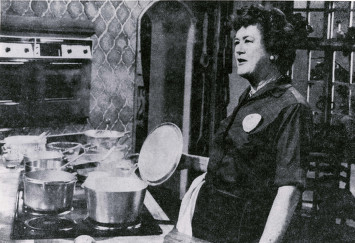Today marks what would have been the 100th birthday of Julia Child, the former OSS worker turned chef, writer, and television personality who introduced the American public to French cuisine. We’re celebrating Child with some of our favorite eating words, from French terms, to cuisines, to types of eaters. Bon appetit!
bonne bouche
“The Old Vic keep their bonne bouche to the last. Vol-au-vent, anchovy toast, devils on horseback? (These culinary similes naturally attach themselves to a play which has such a lot of eating in it; have the psycho-analysts got on to that?)”
Christopher Small, “Wilde Masterpiece Was Clear and Crisp,” The Glasgow Herald, October 31, 1960
A bonne bouche is “a choice mouthful of food; a dainty morsel: said especially of something very excellent reserved to the end of a repast.” Translated from the French as “good mouth,” bonne bouche is also used figuratively to mean a delightful ending.
In contrast, an amuse-bouche, a type of hors d’oeuvre, comes at the beginning of the meal and differs from appetizers in that it is “not ordered from a menu by patrons, but, when served, [is] done so for free and according to the chef’s selection alone.”
cuisine minceur
“It’s true, Michel Guerard says. He did indeed invent cuisine minceur to win the lovely Christine. . . . ‘Vous savez, Michel, if you would lose some weight, you’d look great,’ [Christine] said.”
“‘Minceur’ chef shifts to chocolates,” Pittsburgh Post-Gazette, November 23, 1982
Cuisine minceur is “a low-calorie style of French cooking,” and translates as “cooking thinness.” Other types of French cuisines include haute cuisine, “elaborate or skillfully prepared food” (where haute means “high or elegant” and also give us haute couture); cuisine classique; and nouvelle cuisine, “a contemporary school of French cooking that seeks to bring out the natural flavors of foods and substitutes light, low-calorie sauces and stocks for the traditional heavy butter-based and cream-based preparations.”
epicure
“No; the epicure is the lady’s humble servant, the Prince d’Athis, a man of cultivated palate and fastidious appetite, spoilt by club cooking and not to be satisfied by silver plate or the sight of fine liveries and irreproachable white calves.”
Alphonse Daudet, The Immortal
An epicure is “one given up to sensual enjoyment, and especially to the pleasures of eating and drinking.” The word originally meant “follower of Epicurus,” says Online Etymology Dictionary, where Epicouros was an ancient Greek philosopher “who taught that pleasure is the highest good and identified virtue as the greatest pleasure.” By the 1560s, epicure came to be used “pejoratively for ‘one who gives himself up to sensual pleasure,’” and non-pejoratively by the 1580s.
Some of our favorite synonyms for epicure include bon vivant, “a person with refined taste, especially one who enjoys superb food and drink”; opsophagist, “one who habitually eats dainties”; and trencher-critic, “a person curious in cookery and table-service.” Some gluttonous words we like are belly-god, “one who makes a god of his belly, that is, whose great business or pleasure is to gratify his appetite”; grand-paunch, “a greedy fellow”; and lick-fingers, also “often used by the Elizabethan dramatists as the personal name of a cook.”
gastronomer
“On the heels of the French Revolution, gastronomy developed as a self-conscious aesthetic, modeled on the eighteenth-century discourse of taste. The gastronomer around the turn of the nineteenth century began to make a fine art of food just as his better-known peer, the dandy, would do of fashion.”
Denise Gigante, “Romantic Gastronomies,” Romantic Circles, University of Maryland
A gastronomer is “one versed in gastronomy; one who is a judge of good living; a judge of the art of cookery.” Gastronomer or gastronome is a back-formation of gastronomy, a word that was coined, says Online Etymology Dictionary, in 1800 by Joseph de Berchoux. Gastronomy comes from the Greek gastro, “stomach,” and nomos, “arranging, regulating.”
Gastrology refers to either “the art of cookery or of catering to the demands of the stomach,” or “the scientific study of diseases of the stomach and of their treatment.” A gastro-tourist is, in the words of chef and writer Anthony Bourdain, “somebody who travels to eat.”
goluptious
“Mr M. Nothing! Mis Muddlebrain? You’re insulting! Is it nothing to be able to make a goluptious soup from oyster shells? That’s done by chymistry.”
Douglas William Jerrold, Nell Gwynne
Goluptious is a now obsolete term that means “delicious,” and, according to The Century Dictionary, is a blend a glorious and voluptuous.
kummerspeck
“Kummerspeck is a German word which literally means grief bacon: it is the word that describes the excess weight gained from emotion-related overeating.”
Georgina Pattinson , “Tingo, Nakkele and Other Wonders,” BBC News, September 26, 2005
Mental Floss gathered together some other wonderful non-English food words including shemomedjamo, literally, “I accidentally ate the whole thing,” a Georgian word that refers to continuing to eat when one is already full because the meal is so delicious; pelinti, translated from Ghanian as “to move hot food around in your mouth”; and pålegg, a Norwegian word that refers to anything that might go in a sandwich.
mouthfeel
“Swallowing oysters whole, therefore, is surely akin to dousing them in Tabasco – it means you don’t have to taste them. The swallow-only camp, however, argues that oysters are a sensual experience that’s more about the ‘mouthfeel‘ than flavour: I think they’re just scared.”
Felicity Cloake, “Oysters: Pearls of Wisdom,” The Guardian, February 17, 2010
Mouthfeel refers to “the texture of food or drink as perceived by the mouth,” and seems to have originated in the 1950s.
organoleptic
“If you haven’t had enough by now, drive across the Charles River to Central Square, Cambridge, for an exotic jolt of ice cream or sorbet at Toscanini’s, a funky laboratory of the organoleptic.”
Raymond Sokolov, “Boston Goes Way Beyond Cod,” The Wall Street Journal, May 16, 2009
Organoleptic means “making an impression on an organ; specifically, making an impression on the organs of touch, taste, and smell,” and comes from the French organoleptique.
smell-feast
“As vagrant followers hover on the verge of a camp, or watchful vultures circle around their prey, so these lower parasites (distinct from the other well-born, more aristocratic genus of smell-feast) prowled vigilantly without the castle walls and beyond the limits of the royal pleasure grounds, finding occasional employment from lackey, valet or equerry, who, imitating their betters, amused themselves betimes with some low buffoon or vulgar clown and rewarded him for his gross stories and antics with a crust and a cup.”
Frederic Stewart Isham, Under the Rose
A smell-feast is “one who finds and frequents good tables; an epicure,” as well as “a parasite; a sponger,” and “a feast at which the guests are supposed to feed upon the odors only of the viands.”
toothsome
“There are two sorts of these pies, both made of mincemeat, but the one is made in a dish like an apple pie and eaten hot – rather rich with its hot grease, you may think, but very toothsome I can assure you.”
“A Farmer’s Christmas in the Dales,” The Guardian, December 26, 1903
Toothsome means “palatable; pleasing to the taste,” as well as “pleasant; attractive,” and “sexually attractive or exciting.” The Online Etymology Dictionary says that the “pleasing to the taste” sense is from the 1560s while the figurative sense of “attractive” is “a bit older,” from the 1550s.
For even more celebrating, be sure to check out the special Julia Child page at PBS.
[Photo: Via Wikipedia]

